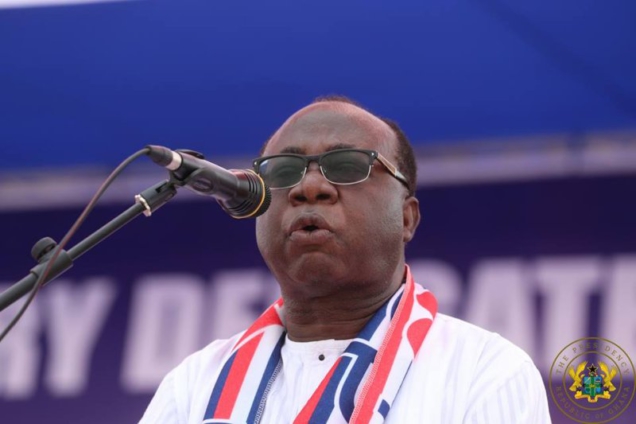Blay Rallies in support, Prof. Asare Parries
By Leo Nelson
Former NPP Chairman, Freddy Blay has sparked a controversial debate on whether or not the presidential term limit provided in the 1992 constitution is absolute.
The shocking comments from the veteran politician have ignited fears of a full-blown constitutional crisis.
Blay brazenly claimed that presidential term limits “may not be absolute” because, in his astonishing words, “the law is in the bosom of the judge”. Suggesting that judges could simply IGNORE presidential term limits.
A revocation of the Presidential term limit could give President John Mahama a rear chance to extend his tenure in office if he offers himself and receive the nod of his party.
Blays assertion has however sent shivers down the spines of legal experts and democracy advocates alike.
Leading the charge against Blay’s controversial remarks is Professor Stephen Kwaku Asare, who has launched a scathing attack, branding the comments not just “disappointing” but downright “dangerous.”
Prof. Asare expressed profound alarm that a figure of Blay’s immense stature would dare to cast doubt on such a fundamental pillar of Ghana’s constitutional governance.
“But worse still, he is not alone,” Prof. Asare declared. “The bosom theory—the idea that law bends to the disposition of the judge—has gained quiet traction across the bar, the bench, and even the classroom. It must be debunked”
Professor Kwaku Asare powerfully emphasized that judges are mere interpreters of the Constitution, NOT its creators. “Their bosoms are not vaults of personal preference but vessels of constitutional fidelity,” he thundered.
He warned that any suggestion the two-term limit for presidents could be open to interpretation is a direct invitation to constitutional instability. Embracing such views, he stressed, “threatens the very foundation of the rule of law.”
Prof. Asare further argued that allowing judges to redefine constitutional mandates based on personal inclination would utterly undermine legal certainty. “Laws must mean the same thing today as they did yesterday.
If judges can redefine ‘two terms’ based on personal whim, the Constitution becomes a moving target,” he noted grimly.
Midway through his blistering critique, Prof. Asare laid bare the terrifying broader consequences, stating that such a theory also “weakens judicial legitimacy.” He underscored that public respect for judges hinges on their faithful application of the law, not on their personal whims.
“The bosom theory turns courts into partisan tools and drains public confidence in justice,” he warned.
Perhaps most chillingly, Prof. Asare cautioned that this theory paves a dangerous path towards authoritarianism, allowing leaders to cling to power, accumulate unchecked authority, and operate without accountability. Ultimately, he warned, it could transform constitutional republics into personal fiefdoms.
The implications, Prof. Kwaku Asare explained, go even deeper. This dangerous ideology fosters strategic litigation, where political actors disregard the actual law and instead focus on manipulating the composition of the judicial panel.
This turns the legal process into a perilous game of chance rather than one grounded in constitutional principles.
“It corrupts judicial appointments,” he declared. “If law lives in the judge’s bosom, politicians will only appoint judges whose bosoms match their ambitions. Judicial independence dies—not with a bang, but with a quiet nod and a partisan handshake,” he stated with a chilling finality.
He also condemned the devastating weakening of constitutional authority, warning that it would reduce the Constitution from a binding legal framework to something entirely optional.
This approach, he argued, transforms clear legal rules into flexible interpretations, “undermining the rule of law and replacing consistency with subjective discretion.”
The damage, Prof. Asare warned, wouldn’t end there. He cautioned that the practice could lead to outright “panel rigging,” where cases are no longer assigned randomly but deliberately manipulated to guarantee favorable outcomes.
In his damning assessment, this form of manipulation would ultimately diminish the authority of Parliament while empowering a select few judicial panels. When a handful of judges can distort clear constitutional provisions, the legislature loses its influence, and the Constitution becomes alarmingly flexible, easily reshaped to fit various agendas.
Prof. Asare concluded with a stark, terrifying warning, emphasizing that such judicial overreach utterly undermines the principle of equality before the law.
In this nightmarish scenario, well-connected individuals would benefit from favorable judicial panels, while ordinary citizens would be left at the mercy of unpredictable legal outcomes, eroding every last shred of public trust in the justice system.
Ultimately, he delivered a chilling reminder of the existential threats posed to the very foundation of democracy itself.
“It sabotages democracy from within: No tanks. No coups. Just ‘interpretation.’ That’s how democracies die—not by force, but by legal theatre. The text survives. The spirit doesn’t,” he declared.
As Ghana grapples with this unfolding debate, many observers fear that the nation’s hard-won democratic principles may now hang precariously in the balance, depending on just how far this dangerous judicial power narrative is allowed to spread.


